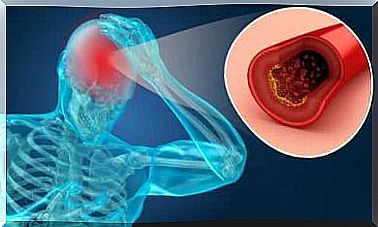Abdominal Swelling: When Should I Be Concerned?
For some, it is a question of aesthetics and, for others, an alteration in the quality of life. Let’s see what causes abdominal swelling and when it should become a cause for concern.

Abdominal swelling is common. Its consequences are generally not serious but it affects the quality of life in a notable way. In fact, more than half of those who suffer from it see their routine altered.
But when should you worry about it? There are as many interpretations of the severity of abdominal swelling as there are people who have it. For some, it is a fleeting thing of no importance, and for others, it is a daily complication. We will tell you more about it in this article.
Abdominal swelling data

Abdominal swelling, distension of the abdomen or swelling of the belly are terms that are often used interchangeably. However, they do not have the same meaning.
Medicine differentiates between swelling and distension. The first is the feeling the person has, the subjective feeling. Abdominal distension is the objective perception of the increase in the size of the abdomen, which can be seen during a physical examination.
In addition, it should be specified that it is not obesity or an accumulation of fatty tissue in the belly. Abdominal swelling affects both overweight and thin people.
According to data published in 2013 by the Journal of Neuro-gastroenterology and Motility , it is calculated that about a third of the population suffers or has suffered from this symptom. The most affected are women, to a greater extent than men.
Causes of abdominal swelling
Perhaps the most common cause of abdominal swelling is heavy and excess food. It is a benign and transient cause, without major complications.
However, there are other more or less serious causes:
- Flatulence: due to the accumulation of intestinal gases, with difficulty in expelling them.
- Irritable bowel syndrome: those who have this pathology suffer from a decrease in the intestinal process.
- Fluid in the abdominal cavity: this is a serious cause and, therefore, it should be treated immediately.
- Pregnancy: During pregnancy, the intestinal transit process can also be slower and increase gas production.
- PMS: It encompasses a set of symptoms that some women experience before their period. Among them we find abdominal swelling. Even though it is not a serious clinical setting, it is quite inconvenient.
- Lactose intolerance: Since the intestine is unable to digest lactose well, fermentation increases in the digestive tract.
When to worry

Abdominal swelling is almost always a mild process. It lasts a few hours and usually goes away without the person having to do anything in particular. However, some situations hide a more serious process.
One of the facts that can cause concern is that the swelling persists. In mild cases, the discomfort should not exceed 24 hours. In cases where the person’s life is in danger, the persistence increases in intensity.
For chronic ailments (such as dyspepsia), the limit is 12 weeks. These 12 weeks also apply to diseases such as celiac disease or malabsorption syndromes. Obviously, these frames are accompanied by diarrhea and major digestive changes.
In addition, gastroenteritis also has accompanying symptoms, which are found in parallel with the distension of the belly. In these cases, there may be diarrhea, vomiting and even fever.
You should be concerned if severe pain is associated with swelling: it becomes essential to rule out problems such as cirrhosis (late stage in the healing of the liver), neoplasias (abnormal or tumor mass in the tissue), clots and thrombi.
Thus, the history and the presence of risk factors can guide the professional in his search for a diagnosis.
How to reduce abdominal swelling
Since the main cause of abdominal swelling is excessive, heavy, or poorly performed eating, some steps can be taken to reduce it. Among these, the American College of Gastroenterology advises:
- Increase fiber in the diet: fruits and vegetables improve intestinal transit thanks to their fiber components. In cases where constipation is the cause of abdominal swelling, their consumption should be increased.
- Performing a physical activity: practicing sports improves the functioning of the digestive tract, helping to eliminate gas.
- Hydration: Consuming the exact amount of water the body needs each day keeps the intestinal mucous membranes hydrated. In addition, it is important that it is water without gas.
- Avoid chewing gum: Excess chewing movement can produce gas in the digestive tract.
- Eat quietly: Large meals that are eaten quickly also alter the movement of the digestive tract. It is recommended to eat slowly, chewing each bite well.
Perform periodic consultations to monitor swelling
It is important to consult a professional if you have any doubts about the characteristics of abdominal swelling. Thus, it is not appropriate to assume that this is something usual or normal.
If you have doubts because you feel the symptom is lasting longer than it should or is accompanied by other signs, make an appointment with your doctor. During this time, you can apply the dietary measures that we have suggested for you to relieve the sensation.









